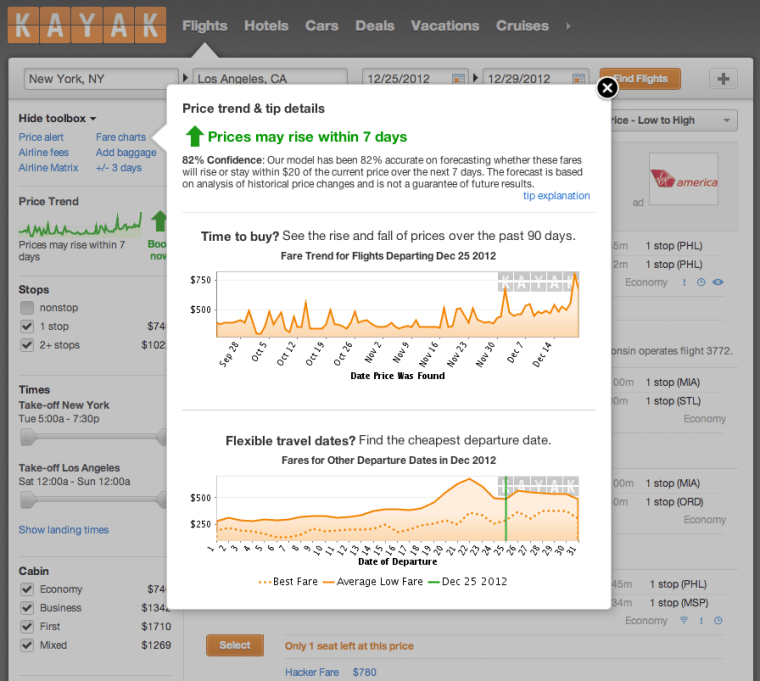To buy now or not to buy now. When it comes to airfares, that is the question for millions of travelers.
On Tuesday, Kayak.com launched a new price-forecasting feature that the company believes will help those travelers make the right decision. The tool predicts whether a particular price will rise or fall, along with a confidence level in the prediction, over the next seven days.
“The whole idea is that when we have enough data for a certain search, we make a forecast to guide the user as to the likelihood that (the fare) will go up or down,” said Giorgos Zacharia, the company’s chief scientist.
According to Zacharia, the tool is based on the popularity of previous searches for the origin and destination in question along with insights gleaned from airline sites, OTAs and two faring engines. The more popular the search, the stronger the data and, by extension, the higher the confidence level.
Consider a recent search for flights from New York to Los Angeles, which returned 1,340 flight options, along with a price trend graph, a note reading “Prices may rise within 7 days” and a suggestion to “Book now.”
Clicking on the graph reveals more detailed information showing price trend history over the last 90 days and a note stating that the company is 82 percent confident that the quoted fares “will rise or stay within $20 of the current price over the next 7 days.”
Conversely, if prices are predicted to drop, the site will advise you to wait as the price may fall within the next 7 days and provide a comparable confidence level in the prediction.
The tool is currently available for U.S. and U.K. searches, covers roughly 50 percent of the flight searches on the site and returns confidence levels ranging from 55 to 95 percent. According to Chief Marketing Officer Robert Birge, the company has also calculated the feature’s overall accuracy level but he declined to share it.
With more than 1 billion searches conducted on Kayak annually, the company clearly has no shortage of data to analyze. (At the same time, having been purchased by Priceline for $1.8 billion, the company also has the financial horsepower to develop and expand new technologies.)
On the other hand, access to lots of data is no guarantee of success. As students of travel technology will likely remember, Kayak is not the first company to offer an airfare-prediction tool. In 2003, Farecast.com debuted a similar concept, touting an overall accuracy of almost 75 percent.
Today, the feature is part of Microsoft’s Bing Travel service but has been reduced to a one-line tip in search results. In 9 out of 10 recent searches, it said simply “Tip: Buy · Fares dropping $50+ · 80%+ Confidence.”
The de-emphasis of price predictions in Bing’s results leads some industry observers to question how valuable such features are.
“Where’s the balance between the investment, the accuracy of the results and delivering something that’s useful to consumers?” asks Norm Rose, president of Travel Tech Consulting. “I would never underestimate the technical prowess of Kayak, especially considering how well they’re funded now, but I would question whether (a fare-predicting tool) will change people’s buying behavior.”
Birge and Zacharia, on the other hand, maintain that more than three months of user-testing showed that usage of the feature was high enough to warrant rolling it out to the main site. For them, it’s part of the company’s efforts to provide as many flight search options as possible, although they stop short of suggesting it will save users from having to make the big decision themselves.
“We’re providing you with information for your decision-making process; we’re not telling you you should book now or not book now,” said Birge. “Overall, you need to use your judgment starting with, if you see a good price, book it.”
Rob Lovitt is a longtime travel writer who still believes the journey is as important as the destination. Follow him at Twitter.
